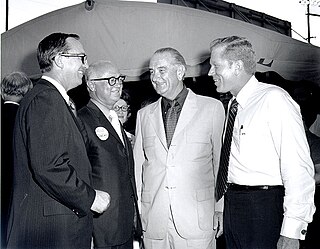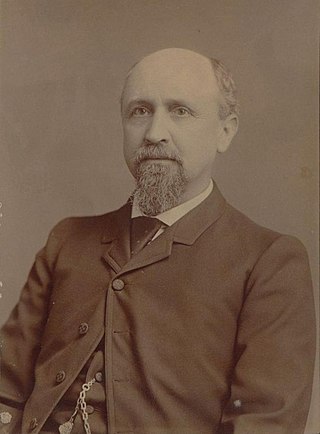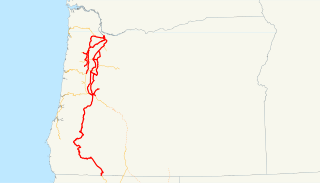Related Research Articles

Ralph Webster Yarborough was an American politician and lawyer. He was a Texas Democratic politician who served in the United States Senate from 1957 to 1971 and was a leader of the progressive wing of his party. Along with Senate Majority Leader Lyndon B. Johnson and Speaker of the House Sam Rayburn, but unlike most Southern congressmen, Yarborough refused to support the 1956 Southern Manifesto, which called for resistance to the racial integration of schools and other public places. Yarborough voted in favor of the Civil Rights Acts of 1957, 1960, 1964, and 1968, as well as the 24th Amendment to the U.S. Constitution, the Voting Rights Act of 1965, and the confirmation of Thurgood Marshall to the U.S. Supreme Court. Yarborough was the only senator from a state that was part of the Confederacy to vote for all five bills.

The Phelps and Gorham Purchase was the purchase in 1788 of 6,000,000 acres (24,000 km2) of land in what is now western New York State from the Commonwealth of Massachusetts for $1,000,000 (£300,000), to be paid in three annual installments, and the pre-emptive right to the title on the land from the Six Nations of the Iroquois Confederacy for $5000 (£12,500). A syndicate formed by Oliver Phelps and Nathaniel Gorham bought preemptive rights to the 9,600-square-mile (25,000 km2) parcel - larger than six present U.S. states: Vermont, New Hampshire, New Jersey, Connecticut, Delaware, and Rhode Island - in New York, west of Seneca Lake between Lake Ontario and the Pennsylvania border, from the Commonwealth of Massachusetts.

The Pulitzer Prize for Investigative Reporting has been awarded since 1953, under one name or another, for a distinguished example of investigative reporting by an individual or team, presented as a single article or series in a U.S. news publication. It is administered by the Columbia University Graduate School of Journalism in New York City.

The Yazoo land scandal, Yazoo fraud, Yazoo land fraud, or Yazoo land controversy was a massive real-estate fraud perpetrated, in the mid-1790s, by Georgia governor George Mathews and the Georgia General Assembly. Georgia politicians sold large tracts of territory in the Yazoo lands, in what are now portions of the present-day states Alabama and Mississippi, to political insiders at very low prices in 1794. Although the law enabling the sales was overturned by reformers the following year, its ability to do so was challenged in the courts, eventually reaching the US Supreme Court. In the landmark decision in Fletcher v. Peck (1810), the Court ruled that the contracts were binding and the state could not retroactively invalidate the earlier land sales. It was one of the first times the Supreme Court had overturned a state law, and it justified many claims for those lands. Some of the land sold by the state in 1794 had been shortly thereafter resold to innocent third parties, greatly complicating the litigation. In 1802, because of the ongoing controversy, Georgia ceded all of its claims to lands west of its modern border to the U.S. government. In exchange the government paid cash and assumed the legal liabilities. Claims involving the land purchases were not fully resolved until legislation was passed in 1814 established a claims-resolution fund.

The Sharpstown scandal was a stock fraud scandal in the state of Texas in 1971 and 1972 involving the highest levels of the state government. The name came from the involvement of the Sharpstown area of Houston.

Lawrence Sullivan "Sul" Ross was the 19th governor of Texas, a Confederate States Army general during the American Civil War, and the seventh president of the Agricultural and Mechanical College of Texas, now called Texas A&M University.

The Oregon and California Railroad was formed from the Oregon Central Railroad when it was the first to operate a 20-mile (32 km) stretch south of Portland in 1869. This qualified the railroad for land grants in California, whereupon the name of the railroad soon changed to Oregon & California Rail Road Company. In 1887, the line was completed over Siskiyou Summit, and the Southern Pacific Railroad assumed control of the railroad, although it was not officially sold to Southern Pacific until January 3, 1927. This route was eventually spun off from the Southern Pacific as the Central Oregon and Pacific Railroad.
Billie Sol Estes was an American businessman and financier best known for his involvement in a business fraud scandal that complicated his ties to friend and future U.S. President Lyndon Johnson.

The savings and loan crisis of the 1980s and 1990s was the failure of 1,043 out of the 3,234 savings and loan associations (S&Ls) in the United States from 1986 to 1995. An S&L or "thrift" is a financial institution that accepts savings deposits and makes mortgage, car and other personal loans to individual members.

Robert Allan Shivers was an American politician who served as the 37th governor of Texas. Shivers was a leader of the Texas Democratic Party during the turbulent 1940s and 1950s and developed the lieutenant governor's post into an extremely-powerful perch in the state government.
A land grant is a gift of real estate—land or its use privileges—made by a government or other authority as an incentive, means of enabling works, or as a reward for services to an individual, especially in return for military service. Grants of land are also awarded to individuals and companies as incentives to develop unused land in relatively unpopulated countries; the process of awarding land grants are not limited to the countries named below. The United States historically gave out numerous land grants as Homesteads to individuals desiring to prove a farm. The American Industrial Revolution was guided by many supportive acts of legislatures promoting commerce or transportation infrastructure development by private companies, such as the Cumberland Road turnpike, the Lehigh Canal, the Schuylkill Canal and the many railroads that tied the young United States together.
Frank Wesley Sharp was a land developer in Houston, Texas, United States who was responsible for creating several large post-World War II housing developments.

The Lockheed bribery scandals encompassed a series of bribes and contributions made by officials of U.S. aerospace company Lockheed from the late 1950s to the 1970s in the process of negotiating the sale of aircraft.

Guy F. Cordon was an American author, politician and lawyer from the state of Oregon. A native of Texas, he served in the Army during World War I and later was the district attorney of Douglas County in Southern Oregon. A Republican, he was appointed and later won election to the United States Senate, serving in office from 1944 to 1955.
The following are the Pulitzer Prizes for 1955.

Wells Fargo & Company is an American multinational financial services company with corporate headquarters in San Francisco, California; operational headquarters in Manhattan; and managerial offices throughout the United States and internationally. The company has operations in 35 countries with over 70 million customers globally. It is considered a systemically important financial institution by the Financial Stability Board.
The Texas Veterans Land Board, also known as VLB, is part of the Texas General Land Office. Created by the Texas Legislature in 1946, the board was established to make land available to veterans returning from World War II.
James Bascom Giles was an American politician who was the Texas Land Commissioner from 1939 to 1955. Implicated in the Veterans' Land Board scandal, he gave up his office and served three years in prison.

The Texas General Land Office (GLO) is a state agency of the U.S. state of Texas, responsible for managing lands and mineral rights properties that are owned by the state. The GLO also manages and contributes to the state's Permanent School Fund. The agency is headquartered in the Stephen F. Austin State Office Building in Downtown Austin.

Lordstown Motors Corporation (LMC) is an American electric vehicle automaker located in Lordstown, Ohio. The company is based at the Lordstown Assembly plant which previously belonged to General Motors.
References
- ↑ Elizabeth Kaderli, "VETERANS' LAND BOARD SCANDAL," Handbook of Texas Online, accessed December 23, 2014. Uploaded on June 15, 2010. Published by the Texas State Historical Association.
- ↑ Varhola, Michael (2011). Texas Confidential: Sex, Scandal, Murder, and Mayhem in the Lone Star State (First ed.). Cincinnati: Clerisy Press. pp. 103–107. ISBN 1578604583.